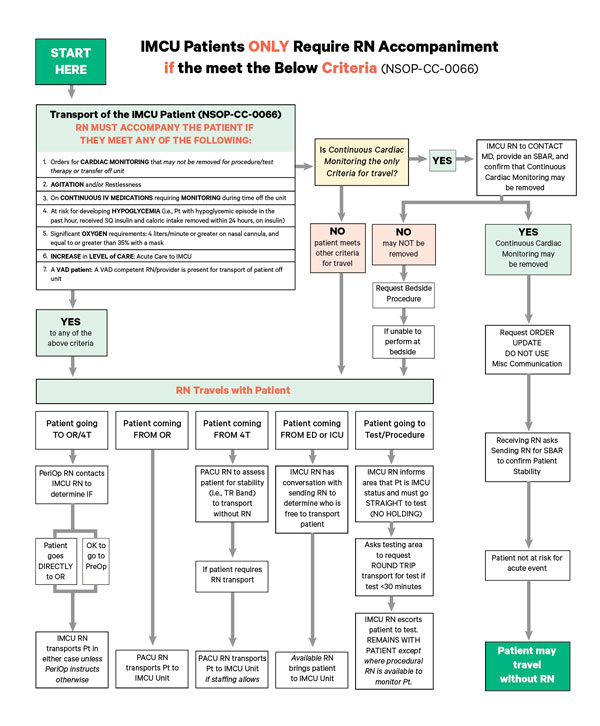RUSH nursing identified a need to establish an intermediate care unit (IMCU) that would admit patients with an increased risk for hemodynamic instability due to complex wounds, greater oxygen requirements, the post-administration of tissue plasminogen activator or the need for extensive surgeries that may take as long as 10 hours. These patients require close monitoring and need frequent assessments and interventions. Nurses in 12E and 12W, collectively called the 12 Tower IMCU, were designated to care for these patients.
The 12 Tower IMCU formed an IMCU operations committee consisting of a clinical nurse specialist, a clinical nurse leader and an IMCU operations champion, who was a bedside nurse. The committee developed guidelines for this new platform, including a mandate that all IMCU patients must by accompanied by a nurse during transport within the hospital. A root cause analysis was conducted by the committee to investigate the existing intra-hospital transportation policies to identify the unique risks of IMCU patients and their need to be accompanied by a nurse when moving off the unit.
An IMCU transportation algorithm was produced to identify patient needs more easily. The next step was to form a key stakeholder working group, which included clinical nurse specialists as well as clinical nurse leaders from intensive care units, post-anesthesia recovery units, procedural areas, the Emergency Department and other units.
The group gained a greater understanding of the shared responsibility for IMCU patients who require a nurse for intra-hospital transport. Workflows were created for a testing area that eliminated holding time and guaranteed IMCU patients were taken directly to the test.
The project’s goal was to empower the 12 Tower IMCU nurses as experts in IMCU patient transportation. The algorithm was posted on the floor, and the IMCU operations champion and clinical nurse leader generated a script to use when obtaining reports to assess patient transportation needs. A script also was created and used for contacting residents to determine if continuous cardiac monitoring could be safely removed. Educational in-services were conducted by the IMCU operations champion for the 12 Tower IMCU nurses.
The development of the updated IMCU transportation policy and algorithm has improved the workflows for patients who must leave the unit for tests and/or procedures. The guidelines have been integrated into the hospital-wide transportation policy.
“It was exciting and satisfying to be involved in the creation of an IMCU unit and participate in a collaborative workflow improvement process that not only resulted in improved patient safety, but brought increased satisfaction to my colleagues by allowing them to spend more time at the bedside caring for their patients,” said one IMCU bedside nurse champion involved in the process.
